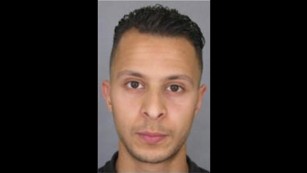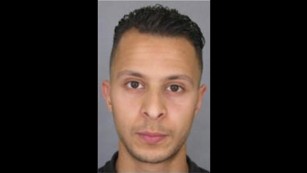Paris attacks: Authorities hunt for a French national
Authorities are hunting for aBelgium-born French national who's one of three brothers suspected in the Paris terror attacks.
Belgian and French officials want to know where Salah Abdeslam is, and Belgium has issued an international warrant for him.
French police released his photo and warned people not to interact with him, saying that he is dangerous.

Salah Abdeslam is suspected of being involved in the attacks.
Investigators haven't said much about how they believe Abdeslam is tied to Friday'sseries of shootings and explosions in the French capital.
Jean-Pascal Thoreau, a spokesman for Belgium's Federal Prosecutor, said Abdeslam is one of three brothers suspected of involvement in the attacks. One of the brothers was killed in the attacks, and another was arrested by Belgian police, Thoreau said.
Salah Abdeslam had been questioned by French police earlier but was not detained, a source close to the investigation into the Paris attacks said.
He was driving in the direction of the Belgian border when stopped by police and questioned a few hours after the attacks, the source said. Now, his whereabouts are unknown.
The Paris attacks killed at least 129 people and wounded more than 350 others, many of them seriously.
Paris terror attack: Names of victims start to emerge
The Islamic terror group ISIS has claimed responsibility for the slaughter, which France's President described as "an act of war."
French fighter jets struck ISIS targets in the Syrian city of Raqqa on Sunday in what officials called a major bombardment and analysts described as a retaliatory move. Authorities made a number of arrests linked to the attacks in Belgium, and investigators homed in on an abandoned car with weapons found in eastern Paris.
Two days after the Paris attacks, the French capital is a city in mourning -- and on edge -- with key questions looming: Do suspects remain at large? Could another attack be in the offing? And how will France and other countries respond?
Hiding among refugees?
It's possible suspects who were directly involved in the attacks remain at large, a French counterterrorism source close to the investigation told CNN.
While investigators pieced together information about who could be on the loose, details emerged about several of the seven attackers who authorities say were killed:
• At least three of the terrorists involved in the attacks had spent time in Syria, a French official told CNN Sunday. The official did not identify the attackers.
• One of three bombers who detonated themselves at the Stade de France late Friday arrived on the Greek island of Leros on October 3 among numerous Syrian refugees,CNN's Christiane Amanpour reported, citing an unnamed French senator who was briefed by the Ministry of the Interior.
The senator told CNN that the man was carrying a fake or doctored Syrian passport, and also a registration document for refugee status issued by Greek authorities. The fingerprints taken by Greek authorities match those of the terrorist who blew himself up at the Stade de France, the senator said.
• Bilal Hafdi, a Belgian resident who is thought to have fought in Syria, was one of the attackers, according to several sources. Hafdi, who was killed in the attacks, was 19 or 20, the sources said.
• One of the suicide bombers has been identified as Ismael Omar Mostefai, according to Jean-Pierre Gorges, the mayor of the French town of Chartres, who is also a member of Parliament. Mostefai lived in Chartres at least until 2012, Gorges said in a Facebook post Saturday.
Paris prosecutor Francois Molins described him as a 29-year-old French citizen with a criminal record from the southern Paris suburbs. The attacker, who was involved inthe assault and hostage-taking at the Bataclan concert hall, was identified by fingerprints and was believed to have been radicalized in 2010 but had never been accused of terrorism, Molins said.
Agnes Thibault-Lecuivre, the Paris prosecutor's spokeswoman, told CNN that six people -- all family relatives of Mostefai -- have been detained. It is common practice in criminal cases in France to place family members in custody. Mostefai's relatives have not been charged or arrested.
News Courtesy: www.cnn.com











